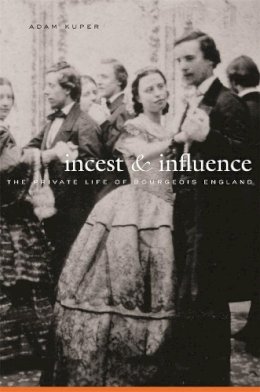
Incest and Influence: The Private Life of Bourgeois England
Adam Kuper
Like many gentlemen of his time, Charles Darwin married his first cousin. In fact, marriages between close relatives were commonplace in nineteenth-century England, and Adam Kuper argues that they played a crucial role in the rise of the bourgeoisie.
Incest and Influence shows us just how the political networks of the eighteenth-century aristocracy were succeeded by hundreds of in-married bourgeois clans—in finance and industry, in local and national politics, in the church, and in intellectual life. In a richly detailed narrative, Kuper deploys his expertise as an anthropologist to analyze kin marriages among the Darwins and Wedgwoods, in Quaker and Jewish banking families, and in the Clapham Sect and their descendants over four generations, ending with a revealing account of the Bloomsbury Group, the most eccentric product of English bourgeois endogamy.
These marriage strategies were the staple of novels, and contemporaries were obsessed with them. But there were concerns. Ideas about incest were in flux as theological doctrines were challenged. For forty years Victorian parliaments debated whether a man could marry his deceased wife’s sister. Cousin marriage troubled scientists, including Charles Darwin and his cousin Francis Galton, provoking revolutionary ideas about breeding and heredity.
This groundbreaking study brings out the connection between private lives, public fortunes, and the history of imperial Britain.
Product Details
About Adam Kuper
Reviews for Incest and Influence: The Private Life of Bourgeois England
and has come up with a startling and irresistible contribution to nineteenth-century social history.
Horace Freeland Judson [A] thoughtful, revealing [book] about the kind of networking that existed long before the Internet, flourishing in the 19th century... [Kuper's] anthropological analysis results in sociological conclusions that are very revealing about culture
scientific, political, economic, social-scientific
in the Victorian age. Here is one scholar who is fearlessly far-ranging in his scope.
Martin Rubin
Washington Times
Incest and Influence presents a richly detailed and fascinating picture of the distinctive family life of the Victorian bourgeoisie.
Gowan Dawson
American Scientist
Adam Kuper brings an anthropologist's understanding to what he calls "one of the great neglected themes" of social and literary history: the preference of the English bourgeoisie for marriage with relatives...He traces clans of bankers and merchants, dynasties of barristers, judges, clergymen, bishops, top civil servants, writers, scientists and thinkers
an urban elite. His thesis is that kin networks provided the basis for the consolidation of the bourgeoisie in the nineteenth century, and that marriage within the family was a strategy.
Norma Clarke
Times Literary Supplement
